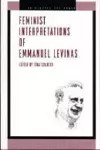
Feminist Interpretations of Emmanuel Levinas
Tina Chanter - Hardback
£99.99
Emmanuel Levinas (1906–1995) was born in Kaunas, Lithuania, and became a naturalized French citizen in 1930. He was influenced by Edmund Husserl, with whom he studied phenomenology, and Martin Heidegger, among others. It was mainly during the 1950s that Levinas began to work out a highly original philosophy of ethics with the aim of going beyond the ethically neutral tradition of ontology. Levinas's first magnum opus, Totality and Infinity (1961), sought to accomplish this departure through an analysis of the 'face-to-face' relation with the Other.
Tina Chanter is Professor of Philosophy at the University of Memphis and the author of Ethics of Eros: Irigaray's Rewriting of the Philosophers (1995) and Time, Death, and the Feminine: Levinas with Heidegger (2001).